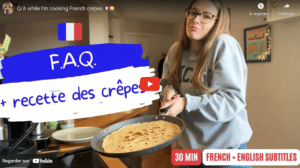Transcription
On an island in Indonesia, an orangutan made a bandage to heal a wound on its face. This is the first time this type of behavior has been observed by scientists.
Hello and welcome to another episode of Learn French with News.
Today, we're going to talk about a positive story that reminds us of the closeness between humans and apes. As usual, you can download the vocabulary sheet for this video to review the words we'll be looking at today by clicking on the link in the description.
The story of Rakus hit the media a few days ago, following the publication of a study in the scientific journal Scientific Reports. Rakus is an orangutan who lives in the wild on the island of Sumatra in Indonesia. He lives in the wild. He is around thirty years old. He is about 30 years old.
This primate is being monitored by scientists and researchers, along with around 130 other animals of the same species, in an area of an Indonesian national park in the north of the island. Incidentally, in Indonesian, orangutan means "man of the forest".
Orangutans belong to the great ape family. Great apes include orangutans, chimpanzees, gorillas, gibbons and humans. Great apes differ from other monkeys in that they have no tail. Instead, we have a coccyx.
In June 2022, Rakus was injured, probably in a fight with another male. He suffered a large wound under his right eye. It was in this context that scientists were able to observe the primate treating itself with a medicinal plant, a plant that helps to heal.
In fact, three days after injuring himself, the researchers noticed that the monkey was beginning to chew on liana leaves, but was not eating them.
Instead, he put the juice of the plant on his fingers, on his open wound. Then he began to cover his wound completely with the pulp, i.e. the flesh of the liana. So he made an ointment, a bandage, from the leaves of a liana.
Five days after starting the treatment, the scientists noticed that the wound had closed. And just 15 days later, only a small scar remained. The wound was completely healed.
In Southeast Asia, these types of liana and plants are known for their anti-inflammatory and antibacterial properties. But this is the first time scientists have observed this type of behavior in a free-ranging primate. Never before have researchers seen a monkey of this species behave in this way, using a plant to treat itself.
According to the study, Rakus's behavior was quite intentional, as he repeated the treatment several times in a precise spot, at the site of his injury. He was also very meticulous in his movements. He was very careful about what he did.
However, the study does not rule out the possibility that the behavior was not deliberate in the first place. It's possible that the monkey unintentionally put some juice on his wound, some juice from the plant, and when he felt a relieving effect, he continued, repeating this action several times. So, sensing that it relieved him to put the juice of the liana on his wound, he would have continued in the days that followed, until he was cured.
The New York Times reports that this study could be a real turning point in the protection of orangutans. Indeed, this species is endangered due to hunting and deforestation.
That's it, the video is over. I hope you enjoyed this lighter news item than we're used to.
Don't forget that you can download the vocabulary sheet from the video to review it.
Of course, if you liked the video, put "j'aime" and above all, don't forget to subscribe if you haven't already, so you don't miss any of my French videos.
See you soon.







